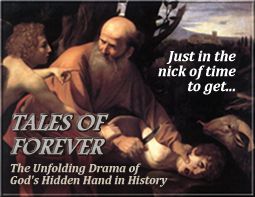The End
Rising from the Ashes
To anyone who is still wrestling with the notion of whether or not such extra-biblical literature constitutes genuine biblical truth, the story of Enoch presents yet another reason to take a fresh look at these remarkable narratives. It is time at last to tear down the walls of prejudice and disinformation that one might retain in light of everything offered in this work, particularly because of the way such narratives have provided the ultimate linchpin in connecting the various lost truths presented here.
Without works like The Book, a knowledge of the prophecy of The Great Five and a Half Days is at risk of being forgotten yet again. Without an awareness of this promise of “days,” there would be no reason to believe that there was any more truth to the 5,500-year chronology from Adam to Christ in The Septuagint Bible than the 4,000-year version found in The Hebrew Bible. Without an awareness of the importance of the Septuagint chronology, there would be nothing to point to the prophetic significance encrypted within the dimensions of The Ark and The Pyramid, or the symbolic message conveyed in The Spear and The Shroud. And without an awareness of how the promise of “days” is confirmed in these sacred dimensions, there would be no awareness that the fulfillment of this prophecy brings in confirming the faithfulness of a God, Who “in the fullness of time,” sent forth His Son to make good on His promise to “rescue Adam and his descendants after five and a half ‘days.’”
Story Continues Below
Says Richard Price—the founder and CEO of Academia.edu—on his podcast In Depth With Academia:
The Book of Days: In Search of the 5,500-year Prophecy Given to Adam About the Coming of Christ is:
To hear Price’s book review of The Book of Days, CLICK HERE.
To hear Kent, Zen Garcia and S. Douglas Woodward as they continue their discussion concerning the implications of the 5,500-year prophecy spoken of in various apocryphal sources and confirmed via the chronology of The Septuagint, CLICK BELOW.
Story Continues From Above
Having said all that, I am, of course, willing to concede that there are diehard skeptics out there who still cling to the possibility that this entire work is merely an exercise in wishful thinking; and for them, I am just as willing—being the eternal optimist that I am—to offer one last argument on their behalf. This argument is presented in the form of an allegory, one in which Enoch’s life story reveals a special truth concerning the literature that has virtually become synonymous with his name. As such, the allegory that I will attempt to describe, just like that of Hippolytus’ allegory of The Ark of the Covenant, will be couched in the same terms that we have seen throughout this work, that is to say, that of death and resurrection. But whereas Hippolytus’ allegory of The Ark pertained to the resurrection of Christ, this allegory of Enoch points not to a bodily resurrection but to a resurrection of the hidden wisdom of the ages penned by him and others like him.
And the reason I am doing this is to address the main objection made by anyone who still insists that any talk of extra-biblical literature is meaningless because, in their view, there was a perfectly good reason these books were left out of Scripture, not to mention, there is nothing in history to account for the restoration of such books once they were excised. Simply put, there is no precedence to be had in all of history for such things as the “death and resurrection” of wisdom. And this, they would further insist, is made all the more evident by the fact that the only thing God has ever seen fit to resurrect is His beloved Son, Jesus.
Sure Enoch walked and talked with the Lord. Sure they must have had a very interesting conversation, but if God never saw fit to make sure that that conversation was inserted into the accepted Canon, then all the conjecture about this literature being providentially lost and restored simply has no precedence in history—biblically or culturally speaking. In short, if it is not in our Bible of today, then that is that: The End.
Or is it? Does the death of wisdom, especially that kind of wisdom associated with The Bible, really spell the end? Or, as we have so often seen in the remarkable world of the supernatural, does this end simply lead, instead, to a new beginning?







